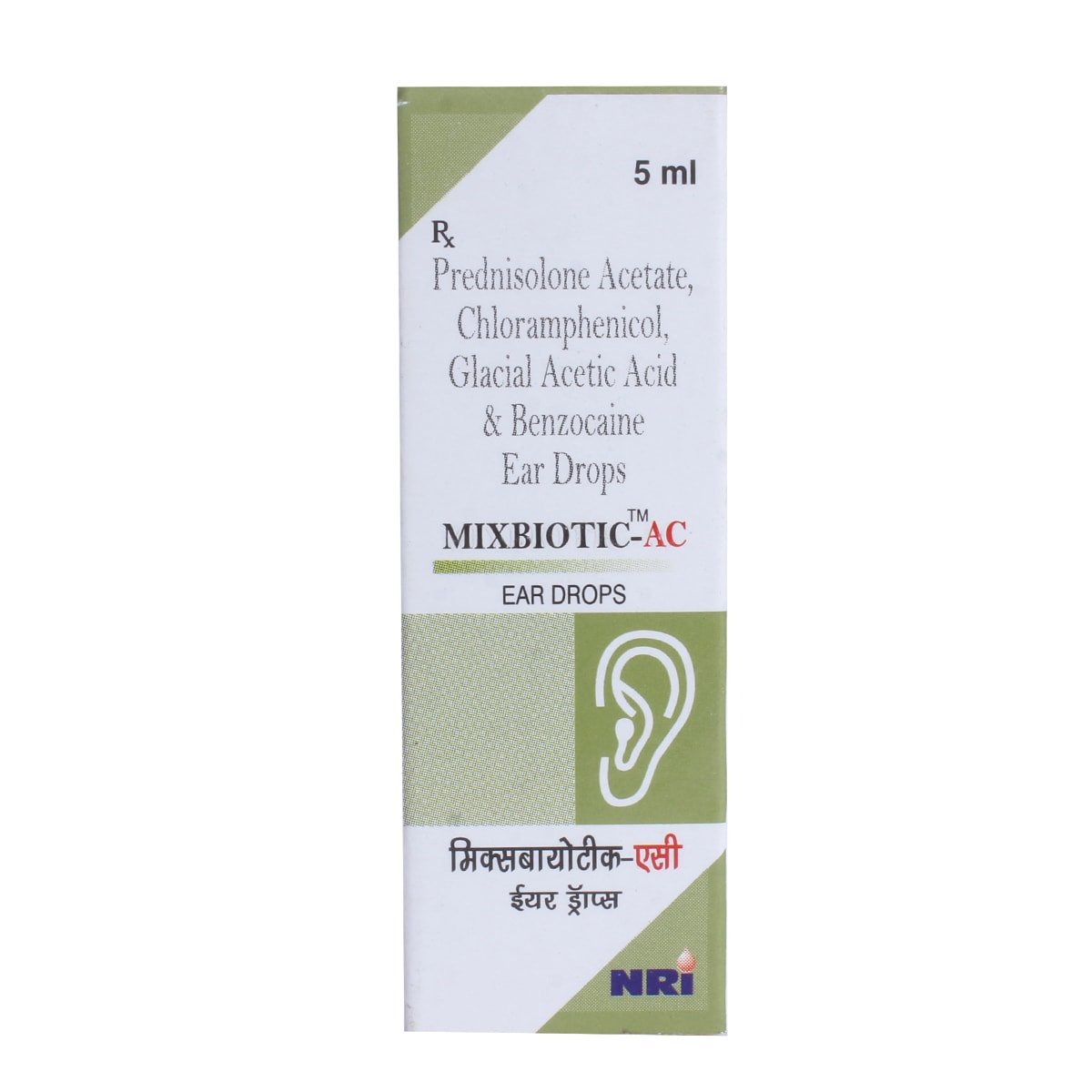Chloramphenicol+benzocaine
About Chloramphenicol+benzocaine
Chloramphenicol+benzocaine belongs to a group of medicines called 'antibiotics' used to reduce pain and discomfort associated with an ear infection (bacterial). Pain is a symptom triggered by the nervous system, causing uncomfortable sensations in the body. Pain may be dull or sharp, constant, or may come and go.
Chloramphenicol+benzocaine is a combination drug containing: Chloramphenicol (antibiotic) and Benzocaine (local anaesthetic). Chloramphenicol works by interfering with the formation of essential proteins required for bacterial growth. Benzocaine blocks the pain signals from the nerves to the brain, numbing the area and relieving pain. Collectively, both of them help to get relief from ear pain.
Chloramphenicol+benzocaine is for otic (ear) use only. Depending on your medical condition, you are advised to use Chloramphenicol+benzocaine for as long as your doctor has prescribed it for you. In some cases, you may experience certain common side-effects such as redness, flaking of the skin, stinging, burning or itching sensation. Most of these side effects do not require medical attention and will resolve gradually over time. However, you are advised to talk to your doctor if you experience these side effects persistently.
Do not use Chloramphenicol+benzocaine if you are allergic to any components present in it. Consult your doctor before using the Chloramphenicol+benzocaine if you are pregnant or breastfeeding. Do not use Chloramphenicol+benzocaine in more than prescribed doses or longer duration. Chloramphenicol+benzocaine is not recommended for children below 12 years. Consult your doctor if your condition does not improve despite using Chloramphenicol+benzocaine for a week. Keep your doctor informed about your health condition and all the medicines you take before taking Chloramphenicol+benzocaine to rule out any side effects.
Uses of Chloramphenicol+benzocaine
Medicinal Benefits
Chloramphenicol+benzocaine belongs to a group of medicines called 'antibiotics' containing: Chloramphenicol (antibiotic) and Benzocaine (local anaesthetic) used to reduce pain and discomfort associated with an ear infection (bacterial). Chloramphenicol works by interfering with the formation of essential proteins required for bacterial growth. Benzocaine blocks the pain signals from the nerves to the brain, numbing the area and relieving pain. Collectively, both of them help to get relief from ear pain.
Directions for Use
Storage
Side Effects of Chloramphenicol+benzocaine
- Redness
- Flaking of skin
- Stinging sensation
- Burning sensation
- Itching sensation
Drug Warnings
Before taking Chloramphenicol+benzocaine, inform your doctor if you have vision problems, severe pain in the eye, sensitivity to light, inflammation of the eye and have a rash on the scalp or face, black or coloured part of the eye looks unusual, foreign body in the eye, recurrent eye infection, glaucoma (raised pressure in the eye), dry eyes, eye injury or eye surgery, or using any other eye drops or eye ointment. Do not use eye/ear drops for longer durations than your doctor recommended as long-term use may cause a cataract of the eye (clouding of the lens) and suppression of the adrenal gland function.
Drug Interactions
Drug-Drug Interactions: Chloramphenicol+benzocaine may interact with an anti-cancer agent (methotrexate), immune suppressant (azathioprine), antiviral drug (ritonavir), a medication used to treat HIV (cobicistat), pain killers (acetaminophen) and antibiotic (cotrimoxazole).
Drug-Food Interactions: No interactions found.
Drug-Disease Interactions: Chloramphenicol+benzocaine should not be used in patients with fungal infections, viral infections such as herpes simplex or varicella, or parasitic infections such as amoebiasis, tuberculosis, damaged cornea, ulceration, and glaucoma (increased pressure inside the eye).
Drug-Drug Interactions Checker List:
Safety Advice

Alcohol
cautionAlcohol may affect your ability to fight infections. So, it is recommended to avoid alcohol until your condition improves.

Pregnancy
cautionChloramphenicol+benzocaine contains a category C drug. It should not be used in pregnant women unless prescribed by your doctor

Breast Feeding
cautionChloramphenicol+benzocaine should be used with caution in breastfeeding mothers.

Driving
safe if prescribedChloramphenicol+benzocaine does not affect your ability to drive.

Liver
cautionLimited information is available to use Chloramphenicol+benzocaine in patients suffering from liver impairment. Please consult your doctor if you have any concerns regarding using Chloramphenicol+benzocaine in patients with liver impairment. Your doctor will prescribe only if the benefits outweigh the risks.

Kidney
cautionLimited information is available to use Chloramphenicol+benzocaine in patients suffering from kidney impairment. Please consult your doctor if you have any concerns regarding using Chloramphenicol+benzocaine in patients with kidney impairment. Your doctor will prescribe only if the benefits outweigh the risks.

Children
safe if prescribedChloramphenicol+benzocaine can be used in children to treat middle and outer ear infections.
Habit Forming
Diet & Lifestyle Advise
- Avoid consuming foods you are allergic to, as it can cause the body to produce excess mucus, leading to ear inflammation.
- Avoid getting things like shampoo, soap, and water into the ear, as it can cause itching.
- Do not poke or scratch the ear, as it can cause damage to the ear canal, leading to inflammation. The inflamed skin can be infected by bacteria or fungi, which can cause infections in the ear.
- Wash your hands often.
- Do not use cotton swabs, bobby pins, or any other objects to remove earwax as it may push wax much deeper into the ear leading to ear damage.
- Never put cold water into your ear, and avoid spraying liquids with force into the ear.
- Consult an ENT regularly for early detection of any ear problems.
Special Advise
- Avoid getting water in your ears while bathing, showering, or swimming while treating an ear infection.
- Avoid prolonged exposure to sunlight while taking Chloramphenicol+benzocaine as it may cause increased photosensitivity (sensitivity to light).
Patients Concern
Disease/Condition Glossary
Pain: It is a symptom triggered by the nervous system, causing uncomfortable sensations in the body. Pain may be dull or sharp; it might be constant or may come and go. The tolerance level of pain might vary from person to person. Pain can be generalized (overall body aches) or localized (affecting a specific area of the body).
FAQs
Chloramphenicol+benzocaine is a combination of two medicines: Chloramphenicol and Benzocaine. Chloramphenicol is an antibiotic and stops the growth of bacteria that is causing the infection. Benzocaine blocks the pain signals from the nerves to the brain, thereby numbs the area and provides relief from pain.
Chloramphenicol+benzocaine may not cause hearing loss. However, if you develop any symptoms such as vertigo (dizziness) or tinnitus (ringing in the ears) while using this medicine, consult your doctor immediately.
Chloramphenicol+benzocaine should not be used for more than 7 days as long-term use may cause unwanted side-effects such as cataracts (cloudy eye). If your condition does not improve within a week, consult your doctor.
Chloramphenicol+benzocaine may not block your hearing aid. However, it is advised to inform your doctor that you are using a hearing aid before taking Chloramphenicol+benzocaine.
Chloramphenicol+benzocaine is safe if taken according to your doctor's instructions. Do not use Chloramphenicol+benzocaine in more than prescribed doses or longer duration as it may cause adverse effects.







